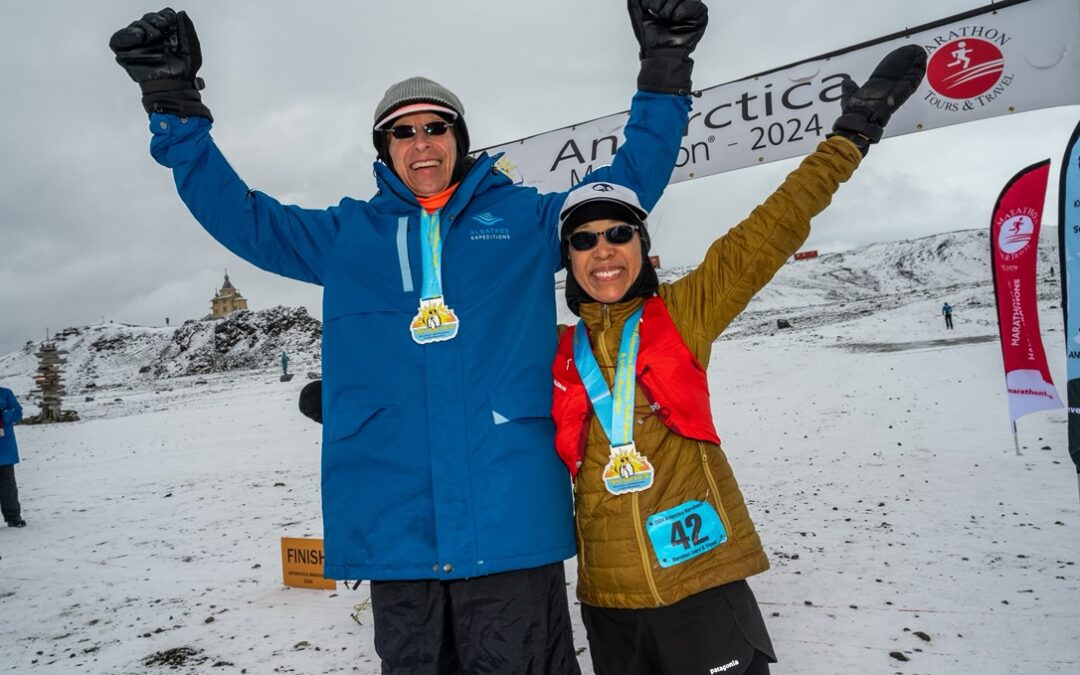by Hae Bolduc
In March, husband Craig Hafer and I completed a marathon on our seventh and last continent by running the Antarctica Marathon. This one brought a different set of challenges from all the others.
Adjust: The first thing we had to adjust was our travel schedule. While preparing to go to the world’s coldest continent, we learned that a big storm was expected to bring three feet of snow to Colorado. We rushed to pack our bags and left Colorado two days earlier than planned!
To reach Antarctica, we flew to Houston, then to Buenos Aires, Argentina, and finally to Ushuaia, the southernmost area of Argentina. (People call this the end of the world.) Then we got on the Albatross Expeditions boat named Ocean Victory for 48 hours on the Drake Passage, the body of water between South America’s Cape Horn, and the South Shetland Islands of Antarctica. The Drake Passage can be wild and is notorious for treacherous voyages. Over the 620 miles of sailing to Antarctica, I could hear its secrets. The wind and waves, however, were very peaceful on our first crossing quieting our minds. On March 20, we arrived in Antarctica.
Adapt: The race team, organized by Marathon Tours and Travel, set up the course on King George Island, one of the South Shetland Islands. We prepared for the March 21 race day by practicing how to get on and off the inflatable zodiac boat with our dry bags and labeling our water bottles. To adhere to the Protocol on Environmental Protection to the Antarctic Treaty, no wrappers or plastic bags were allowed on shore. The wind could easily blow them out of your cold hands and into the water. We could not carry any gel packets. Instead, we put our energy gels in a flask (an idea worth considering for other races).
An inch of snow on the night before the race day welcomed 104 full marathoners and 43 half marathoners, representing 17 countries. A five-minute zodiac ride took us to King George Island at 6:45 a.m. for the 7:30 a.m. first wave start. We placed our mandatory dry bags with our bib number on a tarp, changed from our waterproof zodiac outfit into running clothes and running shoes, and then set out our numbered water bottles, feeling like elite runners. A few members of the Chilean, Chinese, and Uruguayan research bases joined the running events. Those who thought they were going for a vacation (runners’ spouses and friends who came along) became an instant support crew—serving as course marshals, handing out water bottles, and cheering us on along the course.
The course started and finished about 600 feet from Bellingshausen, the Russian base, and passed through the Chilean, Chinese, and Uruguayan bases. Full marathoners ran three loops. The temperature was about 27 degrees Fahrenheit (–3 degrees Celsius), with some sunshine, clouds and five inches of fresh snow throughout the day. We experienced icy and extremely slick conditions, which made the hilly, glacier-carved course even more challenging. The course conditions were similar those of a typical Winter Series race in Colorado Springs: icy, muddy, and snowy. But the course in Antarctica also had 3,000 feet of elevation gain and very rocky sections. The section near the Uruguayan base was so steep that hiking poles were offered. It was difficult to climb in the icy conditions and equally difficult to run, walk, or slide downhill on the slippery terrain.
Despite the challenging conditions, the course was beautiful and magical. We experienced chinstrap penguins running beside us, humpback whales cheering us from a distance, elephant seals peeking to see who was in front, and albatross birds hovering in the sky as if a big event was happening.
Craig and I finished well ahead of the marathon cutoff time of 6 hours and 30 minutes, completing a goal we had been pursuing for 10 years—to run a marathon on all seven continents. Finishing the Antarctica marathon was truly an amazing experience. I am grateful for our local running community, as the Winter Series and Super Half races provided perfect training for the Antarctica Marathon.
Be adventurous: There are some incredible journeys you can experience only once in a lifetime, if that. I am so grateful for the opportunity to run on all seven continents. I hope to join Craig in completing all six World Marathon Majors (Boston, Chicago, New York City, London, Berlin, and Tokyo). We also intend to run marathons in all 50 states.
We are halfway there.
After seeing the wild nature, frozen continent, and amazing wildlife that can be found only in Antarctica, I wished that we could have stayed longer.
We decided not to buy the ship’s wi-fi package, as we discovered that being disconnected from the Internet and social media was a pure luxury. The experience of being removed from all that modern noise for 20 days was relaxing and brought us much serenity.
As we headed home, Antarctica was entering its long winter, and we witnessed ice forming within hours. As we took off from Ushuaia for Buenos Aires, raindrops fell on the windows of our plane. But soon the sun came out and rainbows appeared. I closed my eyes and reflected on the journey to this frozen continent, where we fulfilled a longtime dream of finishing marathons on all seven continents.


Recent Comments